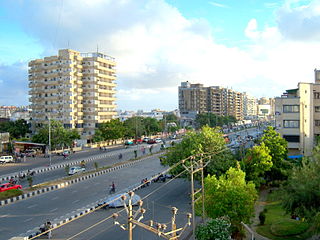
India is the third largest producer of electricity in the world. During the fiscal year (FY) 2019–20, the total electricity generation in the country was 1,598 TWh, of which 1,383.5 TWh generated by utilities. The gross electricity consumption per capita in FY2019 was 1,208 kWh.

Tata Power Company Limited is an Indian electric utility company based in Mumbai, Maharashtra, India and is part of the Tata Group. The core business of the company is to generate, transmit and distribute electricity. With an installed electricity generation capacity of 10,577 MW, it is India's largest integrated power company. Tata Power has been ranked 3rd in 2017 Responsible Business Rankings developed by IIM Udaipur. In February 2017, Tata Power became the first Indian company to ship over 1 GW solar modules.

Adani Group is an Indian multinational conglomerate, headquartered in Ahmedabad. It was founded by Gautam Adani in 1988 as a commodity trading business, with the flagship company Adani Enterprises. The Group's diverse businesses include port management, electric power generation and transmission, renewable energy, mining, airport operations, natural gas, food processing and infrastructure. Adani Group employs over 100,000 people worldwide.
Ultra Mega Power Projects (UMPP) are a series of ambitious power stations planned by the Government of India. This would entail the creation of an additional capacity of at least 100,000 MW by 2022. Ultra Mega Power projects, each with a capacity of 4000 MW or above, are being developed with the aim of bridging this gap.

Solar power is a fast developing industry in India. The country's solar installed capacity was 63.303 GWAC as of 31 December 2022. Solar power generation in India ranks fourth globally in 2021.

Availability Based Tariff (ABT) is a frequency based pricing mechanism applicable in India for unscheduled electric power transactions. The ABT falls under electricity market mechanisms to charge and regulate power to achieve short term and long term network stability as well as incentives and dis-incentives to grid participants against deviations in committed supplies as the case may be.

The economy of Gujarat, a state in Western India, has significant agricultural as well as industrial production within India. Major agricultural produce of the state includes cotton, groundnuts (peanuts), dates, sugar cane, milk and milk products. Gujarat is one of the most industrialised states, with significant presence in pharma, chemicals, refining and petrochemicals, ceramics, textiles, automobile etc. sectors. Gujarat recorded the lowest unemployment rate in India in 2015, with 1.2% of the labour force being unemployed.
Uttar Pradesh Rajya Vidyut Utpadan Nigam Limited (UPRVUNL) was constituted on dated 25.08.1980 under the Companies' Act 1956 for construction of new thermal power projects in the state sector. On 14 January 2000, in accordance to U.P. State Electr Reforms Acts 1999 and operation of U.P. Electricity Reforms Transfer Scheme 2000, U.P. State Electricity Board (U.P.S.E.B.), till then responsible for generation, transmission and distribution of power within the state of Uttar Pradesh, was unbundled and operations of the state sector thermal power stations were handed over to UPRVUNL. Unchahar Thermal Power Station - 420 MW (2X210) & Tanda Thermal Power Station 440 MW (4X110) were transferred to NTPC in year 1992 & year 2000 respectively before unbundling of U.P. State Electricity Board (U.P.S.E.B.) into;
- Uttar Pradesh Rajya Vidyut Utpadan Nigam Limited (UPRVUNL),
- Uttar Pradesh Power Corporation Limited (UPPCL),
- UP Power Transmission Corporation Limited (UPPTCL),
- UP Jal Vidyut Nigam Limited (UPJVNL).
Central Electricity Regulatory Commission (CERC), a key regulator of power sector in India, is a statutory body functioning with quasi-judicial status under sec – 76 of the Electricity Act 2003. CERC was initially constituted on 24 July 1998 under the Ministry of Power's Electricity Regulatory Commissions Act, 1998 for rationalization of electricity tariffs, transparent policies regarding subsidies, promotion of efficient and environmentally benign policies, and for matters connected Electricity Tariff regulation. CERC was instituted primarily to regulate the tariff of Power Generating companies owned or controlled by the government of India, and any other generating company which has a composite scheme for power generation and interstate transmission of energy, including tariffs of generating companies.

Adani Power is an Indian power and energy company which is a part of Adani Group. Based in Khodiyar in Ahmedabad, it is a private thermal power producer, with a capacity of 12,450 MW and operates a mega solar plant of 40 MW at Naliya, Bitta, Kutch, Gujarat.

NTPC Limited, formerly known as National Thermal Power Corporation Limited, is an Indian central public sector undertaking under the ownership of the Ministry of Power, Government of India which is engaged in generation of electricity and allied activities. The headquarters of the psu is situated at New Delhi. NTPC's core function is the generation and distribution of electricity to State Electricity Boards in India. The body also undertakes consultancy and turnkey project contracts that involve engineering, project management, construction management, and operation and management of power plants.
Mithapur Solar Power Plant is a 25 MW solar power plant located in Mithapur, Gujarat. It is expected to produce 40,734 MWh/year. 108,696 230 Wp panels were used.

Mundra Thermal Power Station is located at Mundra in Kutch district in the Indian state of Gujarat. The power plant is one of the coal-based power plants of Adani Power. The coal for the power plant is imported primarily from Bunyu, Indonesia. Source of water for the power plant is sea water from the Gulf of Kutch.

Bihar State Power Holding Company Limited (BSPHCL), formerly Bihar State Electricity Board (BSEB) is a state-owned electricity regulation board operating within the state of Bihar in India. BSEB was established in 1958 as a statutory corporation under the Electricity (Supply) Act, 1948. As of November 2012, BSEB has nearly 1,700 officers and 14,850 employees. The derated capacity comes to just 530 MW. The BSEB was unbundled on 2 August 2011. Power Finance Corporation was the main consultant for BSEB's restructuring.

NTPC, Barauni Or Barauni Thermal Power Station is an existing 720 megawatt coal-fired power station earlier owned by Bihar State Electricity Board (BSEB)and currently by NTPC Limited. The power station is located at Barauni in Begusarai district, Bihar, India. Barauni thermal power station in Bihar came into existence in association with the Russian collaboration and came into operation in the year 1962. Bihar Government was mulling over the idea to hand over Barauni Thermal Power Station to NTPC Limited. On 17 April 2018, Bihar state cabinet, headed by chief minister Nitish Kumar, gave its nod to handing over of Barauni Thermal Power Station to National Thermal Power Corporation. On 15 May 2018, Bihar Government signed a memorandum of understanding (MoU) to hand over the thermal plant to National Thermal Power Corporation for a 33- years lease. East Central Railway will provide uninterrupted supply of coal to thermal power station. NTPC completed the acquisition of 720 MW Barauni thermal power plant with effect from 15 December 2018. The units of Barauni power station will be progressively put under commercial operation. On 27 November 2021, Bihar CM Nitish Kumar inaugurated 250 Megawatts Powerhouse Unit in Barauni Thermal Power Station.
Sasan Ultra Mega Power Plant or Sasan UMPP is one of the four Ultra Mega Power Projects awarded by the Ministry of Power, Government of India. It is located in Sasan village near Waidhan in Singrauli district of Madhya Pradesh. Sasan UMPP is India's largest integrated power generation and coal mine project with 3,960 MW power plant and 20 MT per year coal mining capacity. It is presently the 4th largest electricity generation power plant in India after NTPC Vindhyachal, Mundra Thermal Power and Mundra UMPP. The total project value of Sasan UMPP is ₹25,186 crores.
Uttar Pradesh Power Corporation Limited (UPPCL) is the company responsible for electricity transmission and distribution within the Indian state of Uttar Pradesh. The incumbent chairman is Shri M. Devraj.
The Nabinagar Thermal Power Station Project (NTPS) of Bhartiya Rail Bijlee Company Limited is a wholly owned subsidiary of the Indian Railways, Ministry of Railways, Government of India. It installs a 4X 250 MW thermal power plant at Nabinagar in Aurangabad district, Bihar, India. Nearly 90 per cent of the electricity generated from the plant is supplied to the railways to meet nationwide requirements and remaining 10 per cent is given to Bihar.










